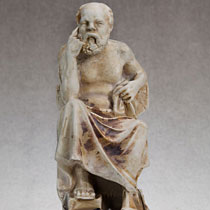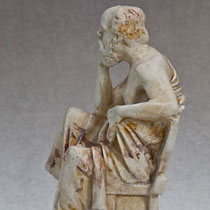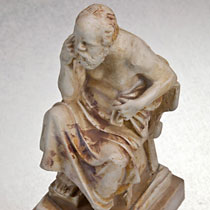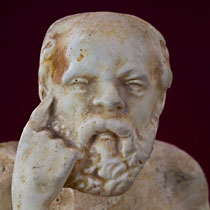Description of Figure/Doll
Small statue of Socrates. He is sitting on chair, wearing a toga. Socrates is a famous Greek philosopher. The statue is made from alabaster. The silver babble on the wire at the base is inscribed with “ANCIENT COPIES” on one side. The other side says “MADE IN GREECE”. Socrates is wearing garments customary for the Greek culture at that time. To learn more, read his story.
Link to higher resolution images at ClipPix
Greece
Location: Southern Europe
Capital: Athens
Main language: Greek
Currency: Euro
Figure/Doll
Construction: ground marble
Height in Centimeters: 13
Height in Inches: 5


The Story of Socrates: A Great Teacher
Reading Level: 5.90
My name is Socrates. I was born in Athens, Greece, in 470 BC. My father was a stonemason, and my mother was a midwife. She delivered babies for many of the wealthy families in the city.
When I was young, I started going to the studio with my father. He taught me how to make stone sculptures by copying some of his carvings (like a horse and chariot). Sometimes my father would tell me to use a different angle with the chisel. I liked his help, but I always asked—“Why?” Many years later, my father said that it was not the sculpting that made me famous. It was the fact that I always asked questions.
When it was time for lunch, Father would send me to the market to buy some food. Back then, all of the Greek men and boys wore togas and tunics. Our legs were bare and we wore leather sandals on our feet (if we could afford them). The women wore one large piece of cloth wrapped around their body. When it was cold, we wore blankets to keep warm.
Everyone in Athens took games very seriously. Ancient Greeks loved to see strong, fit, and handsome human bodies, especially in boys and men. We believed that we would get on the good side of the gods if we exercised, ate right, and oiled our skin. As I walked to the market, I could see many young men training for the Olympic games. I was jealous for two reasons. First, it was only the rich who could afford to spend every day training for competition. Second, I was short and stocky, so I knew I would never look like a Greek “god.”
Ancient Greeks were also very interested in knowledge and learning. I was very fortunate to be able to study drama, science, astronomy, math and geometry. I continued to ask “why” throughout my studies. I especially enjoyed being able to debate with my teachers. I always asked questions about what was right and what was wrong.
When I was much older, my father died, and I inherited his property. Being a man of property, I had to serve in the Athenian army. I fought in many wars, and I was a very good warrior. However, I did not like fighting.
When I came back from the wars, I became a teacher. I would wander the streets of Athens, asking questions, debating issues, and seeking answers. Most of the other teachers charged for their knowledge, but my lessons were free. All I wanted was to inspire others to think and reason. Sometimes my students would get frustrated with me because I would not simply give lectures or answers. Instead, I insisted that they learn by asking questions, debating, and finding a logical conclusion. Unfortunately, my teaching methods and my desire to share knowledge turned out to be my downfall.
When I was 70 years old, I was arrested for worshipping strange gods. My accusers said that I taught young men to think dangerous thoughts. I was found guilty of these “crimes” and sentenced to death. Although my friends had a plan to help me escape from prison, I refused. After spending my life searching for the meaning of right and wrong, I felt it was wrong to run away from the government’s verdict. I told my friends, “No greater good can happen to a man than to discuss virtue every day, and an unexamined life is not worth living.”
So, in the year 399 BC, I chose to end my life quickly by drinking poison. My last words were, “The hour of departure has arrived. We go our separate ways—I to die and you to live. Which is better is known to God alone.”
One of my most famous students (Plato) wrote many stories about my life. Shortly after my death, Plato wrote that I had been: “A man, I think, who was, of all men of his time, the wisest and best and most just.” It warms my soul to know that even now, 2500 years later, I am remembered as one of the greatest teachers of all times. The strategy of learning by asking questions is known as the Socratic Method, and it is used throughout the world.






